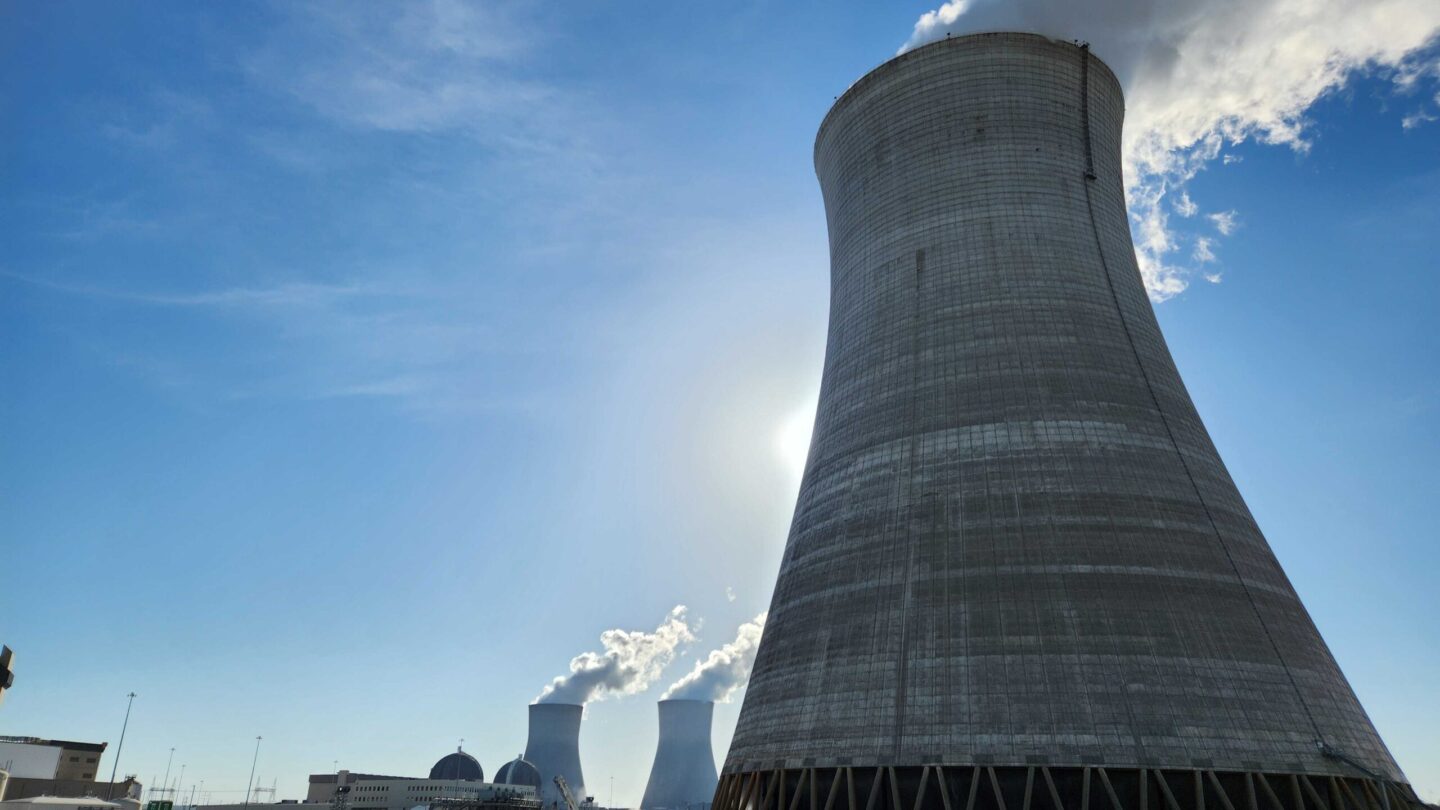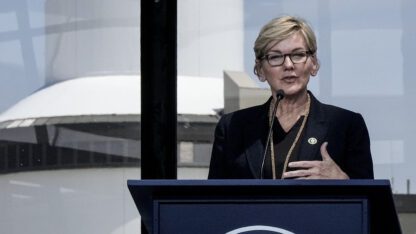This coverage is made possible through a partnership between WABE and Grist, a nonprofit environmental media organization.
With much fanfare and celebration, Georgia Power just marked a major milestone: two new nuclear reactors near Augusta, Georgia, are now generating enough electricity to power a million homes, without using fossil fuels or emitting planet-warming carbon dioxide.
The new Plant Vogtle nuclear reactors are the first built in the US in decades. They entered service years later than originally promised and at twice their original budget, after more than a decade of construction that was plagued by repeated delays and problems including the bankruptcy of the project’s lead contractor.
At the launch event, a parade of utility executives and elected officials celebrated the project as a triumph of perseverance — and a major step forward for clean energy.
Also applauding the effort was Chris Smith, the chief implementation officer for Hyundai’s new electric vehicle plant near Savannah.
“I’m very happy to be here today to support another positive step toward clean energy in Georgia,” Smith told the crowd. “Hyundai is committed to contributing to the sustainable future of society and seeks to achieve carbon neutrality by 2045.”
Smith said the carbon-free power from Plant Vogtle will help the car company reach its climate goal.
As part of that target, Hyundai has pledged to use 100% renewable energy from the start of mass production at the Georgia plant, expected later this year.
And that complicates things, because even with the new reactors at Plant Vogtle, less than half of Georgia Power’s electricity is carbon-free, according to the utility’s data. Hyundai is making up the difference on its own. The company has signed a deal to offset its Georgia energy use with power from a solar farm in Texas.
Go deeper: your guide to electricity and energy policy in Georgia
Voluntary clean energy targets like Hyundai’s are common — as are workarounds to meet the goals in time.
As climate change intensifies, this story is playing out repeatedly in Georgia and across the country. Key deadlines for clean energy targets are looming, and companies and local governments can’t achieve those goals on their own. They need support from electric utilities and regulators, support that some say isn’t coming fast enough.
“Your schedule for operation is not dependent on your utility’s programs,” said Katie Southworth, who leads southeast policy work for the Clean Energy Buyers Association, which represents more than 400 members looking to go carbon-free. “You have to have energy day one.”
Georgia Power’s parent, Atlanta-based Southern Company, has its own goal: net zero carbon emissions by 2050. At the company’s annual meeting in May, CEO Chris Womack touted its progress.
“Over 80% of the resource additions planned across our system, totaling nearly 10,000 megawatts from 2023 to 2030, are zero-carbon emitting resources,” he said.
“Our clean energy plan says it explicitly that we’re not going to be able to meet our clean energy goals without [Georgia Power].”
The city of Decatur’s energy and sustainability manager David Nifong. The city aims for citywide clean energy by 2050, but Nifong said they need help from Georgia Power to do it.
Still, Southern Company subsidiaries like Georgia Power are also adding new gas plants and putting off coal retirements, committing to continued carbon emissions for years in the future.
Georgia Power and Southern Company both declined interviews for this story. Georgia Power pointed to its programs to expand clean energy, and Southern says it’s committed to its own net zero target.
Still, these and other utilities’ pace of change has companies and governments worried about meeting their own clean energy targets. Some look for sources of energy outside their utility, as in the Hyundai example, and some are wading into the world of state energy regulation, aiming to change utilities’ plans.
The city of Decatur’s energy and sustainability manager David Nifong said the city is adding solar panels and improving energy efficiency as it aims for its goal for citywide clean energy by 2050. But, he said, Decatur can’t do it alone. The city needs help from Georgia Power.
“Our clean energy plan says it explicitly that we’re not going to be able to meet our clean energy goals without the utility,” he said.
So Decatur has joined forces with other local governments across the state to intervene before the state’s Public Service Commission, which has final say over Georgia Power’s prices and energy sources.
Large corporations like Microsoft are citing their own fast-approaching clean energy deadlines as they get involved with the PSC as well.
Even the U.S. Department of Defense, which is trying to achieve carbon-free energy by 2035, had harsh words at PSC hearings earlier this year about Georgia Power’s updated integrated resource plan (IRP), which lays out the utility’s long-range plans for generating electricity.
“I’m frustrated that we are probably your biggest customer and nothing in this IRP addresses any of our needs, which are substantial,” said DOD lawyer John McNutt.
The Clean Energy Buyers Association is working with Georgia Power to update its clean energy programs for large customers.
“Our members are very motivated to bring solutions to utility commissions and to utilities,” said Southworth.
And, she said, those large customers are willing to pay for adding clean energy.
Other advocates say they’re making some headway, too.
‘We need utilities to match our ambition’
Georgia Power has pledged to develop a new clean energy program that Nifong and the other local governments pushed for, which will help customers install renewable energy paired with batteries that Georgia Power can draw on to bolster the power grid when demand spikes. The recently-approved IRP adds battery storage to existing solar fields at two Air Force bases.
Still, as death tolls from blistering heat rise and extreme weather intensifies, critics say the utility is still moving too slowly — extending carbon emissions that climate experts say the planet can’t afford.
“We need utilities to match our ambition,” Southworth said.









